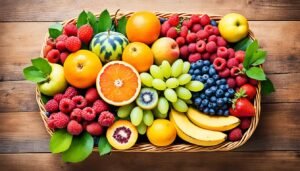Get our FREE E-Book HERE - 120 TIPS for Losing Weight & Bonus Tips for Postpartum Weight Loss & Dad’s Postpartum Experience
Does Vegan Diet for Weight Loss Work?
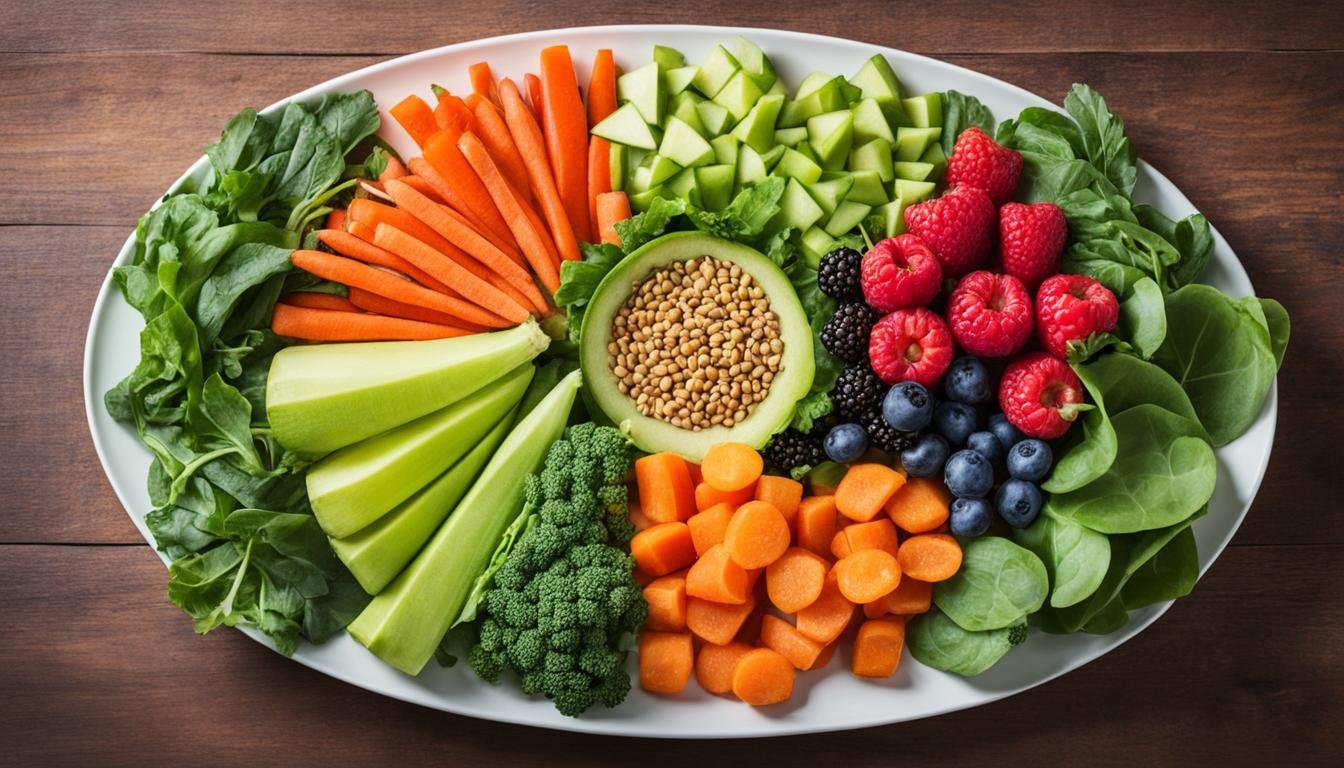
Are you looking for a sustainable and effective way to lose weight? Contrary to popular belief, a vegan diet can be the answer you’ve been searching for. By following a plant-based diet and eliminating animal products from your meals, you can achieve your weight loss goals while enjoying numerous health benefits.
But how does a vegan diet for weight loss actually work? And what are the key factors you need to consider to maximize your results? In this article, we will delve into the basics of a vegan diet, explore its impact on weight management, and provide you with valuable tips for success.
Key Takeaways:
- A vegan diet can be an effective tool for weight loss and offers numerous health benefits
- Eliminating animal products and focusing on plant-based foods is the cornerstone of a vegan weight-loss program
- A high-fiber, nutrient-rich vegan diet promotes satiety and reduces caloric intake
- Ensure proper nutrient intake, including protein, vitamin B12, iron, and omega-3 fatty acids, when following a vegan diet
- Adopting a vegan weight loss program can lead to long-term weight control success and improvements in metabolism and insulin sensitivity
Understanding the Basics of a Vegan Diet for Weight Loss
A vegan diet is a plant-based eating plan that excludes all animal products, including meat, fish, poultry, dairy, eggs, and honey. Instead, it focuses on consuming a variety of plant-based foods such as fruits, vegetables, whole grains, legumes, nuts, and seeds. These foods are not only delicious but also offer numerous benefits for weight loss and overall health.
What Constitutes a Vegan Diet?
A vegan diet is centered around plant-based foods that are rich in fiber, vitamins, minerals, and antioxidants. These nutrients are essential for supporting weight loss and promoting overall well-being. By incorporating a wide variety of fruits and vegetables, individuals following a vegan diet can enjoy a range of flavors and textures while reaping the benefits of a nutrient-dense eating plan.
Satiety and Caloric Intake on a Plant-Based Diet
A key advantage of a vegan diet for weight loss is its high fiber content. Plant-based foods are naturally high in fiber, which helps promote feelings of satiety and reduces overall caloric intake. By incorporating more fiber into your meals and snacks, you can stay fuller for longer, making it easier to adhere to your weight loss goals and avoid unnecessary snacking.
Furthermore, plant-based foods tend to be lower in calories compared to animal-based products. This means you can enjoy larger portion sizes of fruits, vegetables, legumes, and whole grains without consuming excessive calories. By focusing on plant-based foods, you can create a caloric deficit, which is essential for effective weight loss.
Nutritional Considerations for Weight Management
While a vegan diet offers numerous health benefits, it is important to ensure you are getting all the essential nutrients necessary for weight management. Some key nutrients to pay attention to include:
- Protein: Incorporate plant-based protein sources such as legumes, tofu, tempeh, and seitan to meet your protein needs.
- Vitamin B12: As vitamin B12 is primarily found in animal products, vegans need to include fortified foods or supplements in their diet.
- Iron: Plant-based sources of iron include leafy greens, lentils, beans, and fortified grains. Consuming these with vitamin C-rich foods can enhance iron absorption.
- Omega-3 Fatty Acids: Include plant-based sources of omega-3 fatty acids such as chia seeds, flaxseeds, and walnuts, or consider a vegan omega-3 supplement.
The Health Benefits of a Vegan Weight Loss Program
Adopting a vegan weight loss program can lead to long-term weight control success. By reducing calorie intake and increasing fiber consumption, you can achieve sustainable weight loss and maintain a healthy weight. Additionally, a vegan diet has been shown to improve insulin sensitivity and boost metabolism, further supporting your weight management efforts.
Long-Term Weight Control Success
Choosing a vegan diet for weight loss can have long-term benefits. By following a sustainable eating plan that focuses on plant-based foods, you can lose weight and keep it off for the long term. This is because a vegan diet typically encourages the consumption of nutrient-dense foods that are low in calories and high in fiber, helping you feel satisfied and reducing the likelihood of weight regain.
Reduced Calories and High Fiber Benefits
One of the key reasons a vegan diet can be effective for weight loss is its focus on reducing calorie intake. A vegan diet naturally eliminates high-calorie animal products, such as meat and dairy, and replaces them with lower-calorie plant-based alternatives. Additionally, plant-based foods are rich in fiber, which adds bulk to your meals, promotes feelings of fullness, and helps regulate your appetite. By including a variety of fruits, vegetables, whole grains, legumes, nuts, and seeds in your diet, you can enjoy the benefits of a high-fiber diet that supports sustainable weight loss.
Impact on Metabolism and Insulin Sensitivity
Another advantage of a vegan weight loss program is its positive impact on metabolism and insulin sensitivity. Research suggests that following a vegan diet can increase your metabolic rate, allowing you to burn calories more efficiently. Additionally, a vegan diet has been shown to improve insulin sensitivity, which helps regulate blood sugar levels and may reduce the risk of developing type 2 diabetes. By improving your body’s ability to metabolize food and regulate blood sugar, a vegan diet can support your weight management goals.

Types of Vegan Diet
When it comes to following a vegan diet for weight loss, there are various types that you can explore. Each type offers unique benefits and focuses on specific dietary principles. Understanding these different types can help you choose the one that aligns best with your weight management goals. Let’s take a closer look at some of the most popular types of vegan diets:
Raw Vegan Diet
The raw vegan diet involves consuming uncooked and unprocessed plant-based foods. This includes fruits, vegetables, nuts, seeds, and sprouted grains. The primary goal of this diet is to maximize the intake of natural enzymes and nutrients found in raw foods. Proponents of the raw vegan diet believe that cooking food destroys essential nutrients and enzymes, and by consuming raw foods, they can lead a healthier and more vibrant lifestyle.
Mediterranean Vegan Diet
The Mediterranean vegan diet combines the principles of a vegan diet with the traditional Mediterranean diet. This diet emphasizes whole foods, legumes, fruits, vegetables, whole grains, nuts, seeds, and olive oil. By incorporating the health-promoting aspects of both diets, the Mediterranean vegan diet offers a balanced approach to weight loss while providing an array of nutrients and antioxidants.
Vegan Keto Diet
The vegan keto diet focuses on a low-carbohydrate, high-fat intake to achieve ketosis. While a traditional keto diet relies heavily on animal-based fats and proteins, a vegan keto diet replaces these sources with plant-based alternatives. This diet typically includes foods such as avocados, nuts, seeds, coconut oil, and plant-based protein sources like tofu and tempeh.
Vegan Diabetic Diet
The vegan diabetic diet is specifically designed for individuals with diabetes. It focuses on controlling blood sugar levels while following a vegan lifestyle. This diet includes low-glycemic index foods, such as non-starchy vegetables, whole grains, legumes, and plant-based proteins. By avoiding high-sugar foods and emphasizing nutrient-dense choices, the vegan diabetic diet can help manage blood sugar levels and support weight loss.
Alkaline Vegan Diet
The alkaline vegan diet emphasizes consuming foods that promote an alkaline environment in the body. This diet includes fruits, vegetables, nuts, seeds, and whole grains while excluding acidic foods such as meat, dairy, and processed foods. Proponents of the alkaline vegan diet believe that it can help balance the body’s pH levels and promote overall health and weight loss.
Low-Carb Vegan Diet
The low-carb vegan diet restricts carbohydrates while focusing on plant-based protein and fat sources. This diet includes foods such as non-starchy vegetables, tofu, tempeh, seitan, avocados, nuts, and seeds. By limiting carbohydrate intake, the low-carb vegan diet aims to promote weight loss by reducing insulin levels and encouraging the body to burn stored fat for energy.
High-Protein Vegan Diet
The high-protein vegan diet prioritizes plant-based protein sources to meet increased protein needs. This diet includes foods such as legumes, soy products, seitan, tofu, tempeh, and plant-based protein powders. By consuming adequate protein, the high-protein vegan diet supports muscle growth, recovery, and weight loss.
Vegan Anti-inflammatory Diet
The vegan anti-inflammatory diet focuses on consuming foods that help reduce inflammation in the body. This includes fruits, vegetables, whole grains, legumes, nuts, seeds, and healthy fats. By avoiding processed foods, refined sugars, and artificial ingredients, the vegan anti-inflammatory diet can help alleviate chronic inflammation and support weight loss.
Vegan vs. Vegetarian Diets
While both vegan and vegetarian diets exclude meat, fish, and poultry, they differ in the inclusion of other animal products. Vegans avoid all animal products, including dairy, eggs, and honey, while vegetarians may include these items in their diet.
From a weight loss perspective, both diets can be effective, but a vegan diet may offer more weight loss benefits due to its lower calorie and fat content. By eliminating animal products entirely, a vegan diet naturally reduces overall calorie and fat intake, which can contribute to weight loss. Additionally, a vegan diet is typically rich in fiber, which promotes satiety and can help control appetite.
To further understand the differences between vegan and vegetarian diets, let’s take a closer look at some key points:
- Inclusion of Animal Products: Vegans exclude all animal products, while vegetarians may include dairy, eggs, and honey in their diet.
- Calorie and Fat Content: A vegan diet is generally lower in calories and fat compared to a vegetarian diet, which can aid in weight loss.
- Fiber Intake: Due to the emphasis on plant-based foods, both vegan and vegetarian diets are typically high in fiber. However, a vegan diet may offer even more fiber due to the exclusion of dairy and eggs.
- Nutrient Considerations: While both diets can provide adequate nutrients when well-planned, vegans need to pay extra attention to sources of nutrients like vitamin B12, iron, and omega-3 fatty acids, which are commonly found in animal products.
Ultimately, the choice between a vegan or vegetarian diet for weight loss depends on individual preferences and ethical considerations. Both options can be effective, but it’s important to ensure a well-balanced and nutrient-dense diet regardless of the chosen eating style. Now that we’ve explored the differences between vegan and vegetarian diets, let’s delve into the various types of vegan diets in the next section.
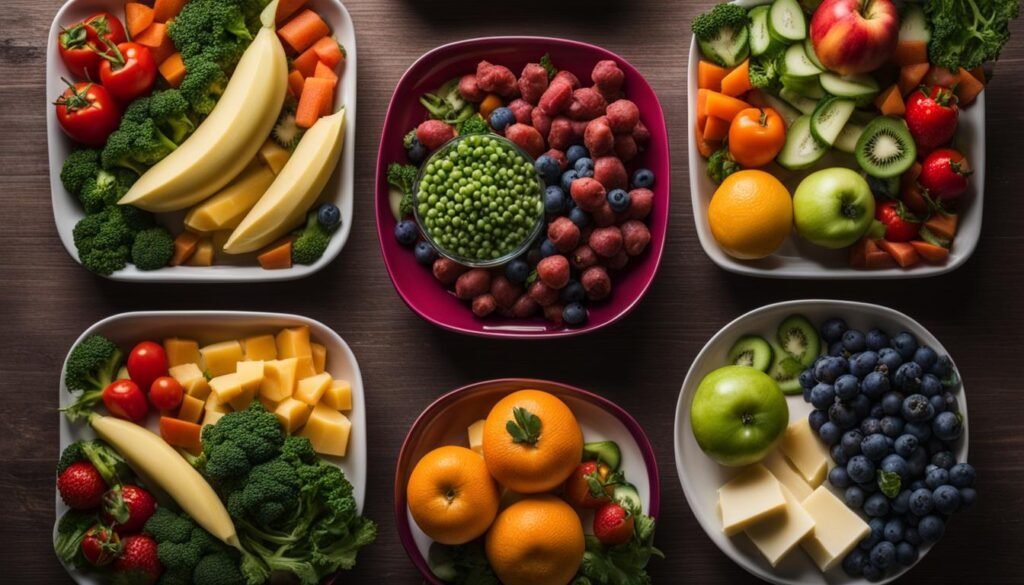
Vegan Foods
Foods to Eat
A vegan diet for weight loss includes a variety of plant-based foods. These foods are not only nutritious but also help support your weight loss goals. Here are some key foods to include in your vegan diet:
- Fruits: Include a wide variety of fruits such as berries, apples, oranges, and bananas. They provide essential vitamins, minerals, and antioxidants.
- Vegetables: Load up on leafy greens, cruciferous vegetables like broccoli and cauliflower, and colorful options like bell peppers and tomatoes.
- Whole Grains: Choose whole grains like quinoa, brown rice, oats, and whole wheat bread to provide sustained energy throughout the day.
- Legumes: Incorporate beans, lentils, chickpeas, and tofu for plant-based protein, fiber, and other essential nutrients.
- Nuts and Seeds: Snack on a variety of nuts and seeds such as almonds, walnuts, chia seeds, and flaxseeds. They are a great source of healthy fats and provide satiety.
Foods to Avoid
To adhere to a vegan diet for weight loss, it is important to avoid certain foods:
- Meat, Fish, and Poultry: Eliminate all animal-based products, including red meat, poultry, and seafood.
- Dairy Products: Avoid dairy milk, cheese, yogurt, and butter, as they are derived from animal sources.
- Eggs: Exclude eggs, including egg-based products like mayonnaise and certain baked goods.
- Honey: Honey is a natural sweetener produced by bees, so it is not considered vegan-friendly.
Vegan Supplements
In some cases, vegan supplements may be necessary to ensure you meet your optimal nutrient requirements. While a well-planned vegan diet can provide most nutrients, there are a few key supplements that may be beneficial:
- Vitamin B12: As a vegan, it may be challenging to obtain sufficient vitamin B12 from plant-based sources alone. Consider taking a vitamin B12 supplement to maintain adequate levels.
- Calcium: Choose a vegan-friendly calcium supplement to support bone health, as dairy products are a common source of calcium for many individuals.
- Vitamin D: If you have limited sun exposure, especially during winter months, consider taking a vegan vitamin D supplement to support bone health and overall well-being.
- Iron: Iron deficiency can be a concern for vegans, especially women. Consider a vegan iron supplement if you are at risk of deficiency.
Vegan Diet: Pregnancy and Breastfeeding
If you are following a vegan diet during pregnancy or breastfeeding, it is important to pay extra attention to meeting your nutrient needs for both yourself and your baby. Consult with a healthcare professional or registered dietitian who specializes in vegan nutrition to ensure you are getting adequate nutrients such as iron, calcium, omega-3 fatty acids, and vitamin B12. They may recommend specific supplements or modifications to your diet to support a healthy pregnancy and breastfeeding journey.
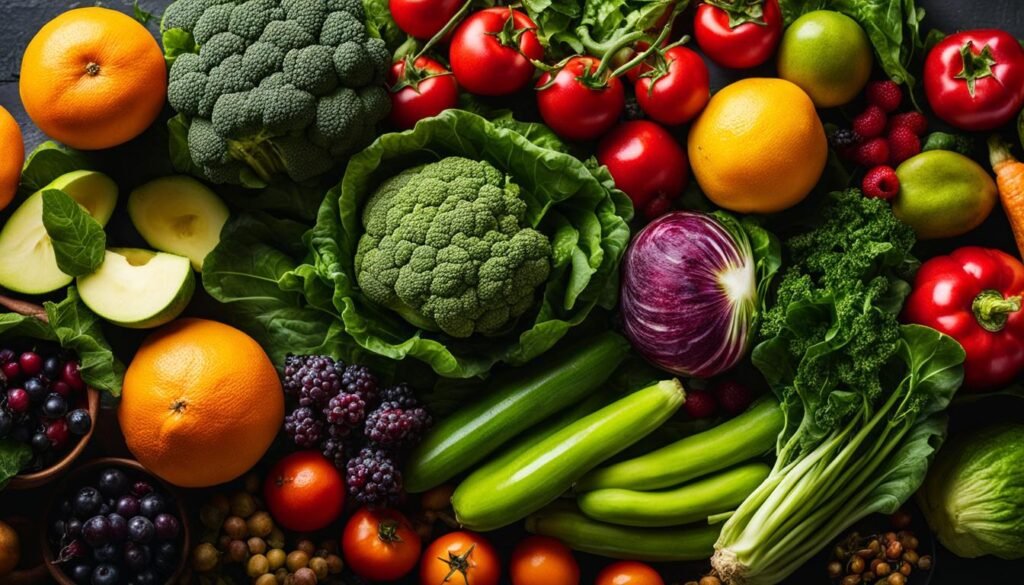
Designing an Effective Weight Loss Plan on a Vegan Diet
Focusing on Whole Foods Over Processed Alternatives
To design an effective weight loss plan on a vegan diet, it is crucial to prioritize whole foods over processed alternatives. Whole foods, such as fruits, vegetables, whole grains, legumes, nuts, and seeds, are naturally nutrient-dense and provide a wide range of essential vitamins, minerals, and antioxidants. These foods promote satiety, helping to curb cravings and control calorie intake. By incorporating a variety of colorful fruits and vegetables, whole grains like quinoa and brown rice, and plant-based proteins like lentils and tofu, you can create a well-rounded meal plan that supports your weight loss goals.
Including whole foods in your vegan diet not only aids weight loss but also provides the body with important nutrients for optimal health. Remember, the key is to focus on nutrient-dense choices that nourish your body and keep you satisfied throughout the day.
Essential Nutrients for a Balanced Vegan Diet
When following a vegan diet for weight loss, it’s important to ensure you’re getting all the essential nutrients your body needs. While a well-planned vegan diet can provide all the necessary nutrients, there are a few nutrients of particular concern:
- Protein: Incorporate plant-based sources of protein such as beans, lentils, tofu, tempeh, and quinoa into your meals to ensure adequate protein intake.
- Vitamin B12: Include fortified foods like plant-based milks, breakfast cereals, and nutritional yeast, or consider taking a B12 supplement.
- Iron: Consume iron-rich plant foods like dark leafy greens, lentils, tofu, and pumpkin seeds, and pair them with a source of vitamin C, such as citrus fruits or bell peppers, to enhance iron absorption.
- Omega-3 Fatty Acids: Incorporate plant-based sources of omega-3 fatty acids like flaxseeds, chia seeds, and walnuts into your diet.
By paying attention to these nutrients and incorporating a variety of whole plant foods into your meals, you can meet your nutrient needs and achieve a balanced vegan diet for weight loss.
Portion Control and Meal Timing Strategies
In addition to focusing on whole foods and essential nutrients, practicing portion control and implementing strategic meal timing strategies can support weight loss on a vegan diet. Here are some tips:
- Eat smaller portion sizes: Be mindful of portion sizes to avoid overeating. Use smaller plates and bowls, measure servings, and listen to your body’s hunger and fullness cues.
- Space out meals and snacks: Eating smaller, frequent meals and snacks throughout the day can help regulate blood sugar levels, prevent excessive hunger, and avoid overeating at meal times.
- Avoid late-night snacking: Try to finish your last meal or snack at least 2-3 hours before bedtime to allow for proper digestion and prevent unnecessary calorie intake.
By practicing portion control and spacing out your meals and snacks, you can maintain steady energy levels, prevent hunger pangs, and support your weight loss journey on a vegan diet.
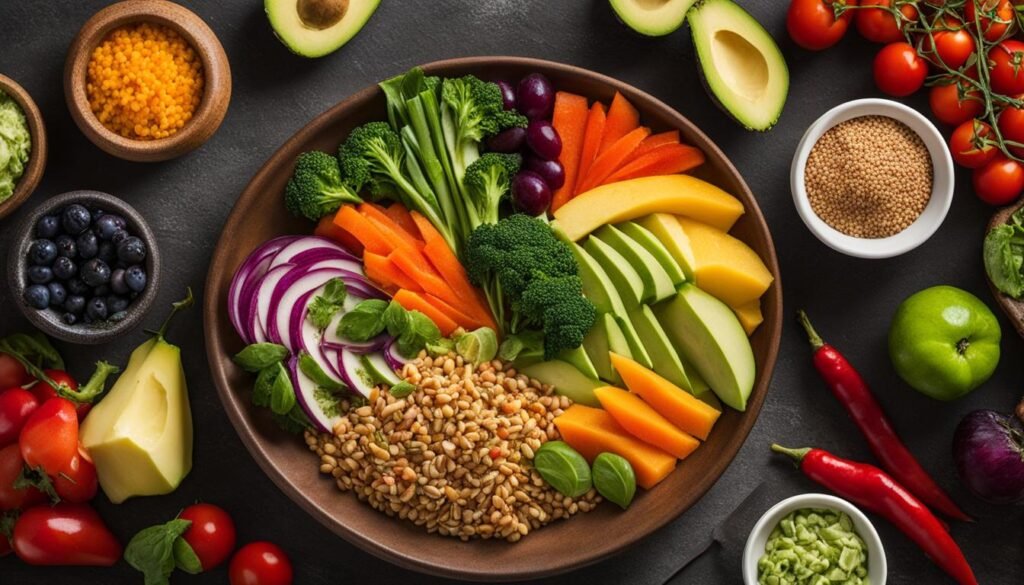
Common Pitfalls and How to Avoid Them
While following a vegan diet can be beneficial for weight loss, it’s important to be aware of common pitfalls that can hinder your progress. By understanding these challenges and taking proactive steps to overcome them, you can ensure a successful weight loss journey on a vegan diet.
Risks of Yo-Yo Dieting and Nutrient Deficiencies
One common pitfall to avoid is yo-yo dieting, which refers to the cycle of losing weight and regaining it repeatedly. Yo-yo dieting can have negative health consequences, such as a slowed metabolism, loss of muscle mass, and increased risk of nutrient deficiencies. To avoid yo-yo dieting, focus on creating sustainable habits and making gradual changes to your eating patterns rather than resorting to extreme or restrictive diets.
Additionally, maintaining proper nutrient balance is crucial on a vegan diet. It’s essential to ensure you’re meeting your nutritional needs for vital nutrients such as protein, iron, vitamin B12, calcium, and omega-3 fatty acids. Regularly monitor your nutrient intake and consider incorporating fortified foods or supplements if necessary.
Overconsumption of Vegan Junk Food
Another pitfall to be mindful of is the overconsumption of vegan junk food. While there are plenty of vegan alternatives to popular processed snacks and sweets, relying too heavily on these foods can hinder your weight loss progress. Vegan junk food often lacks the nutritional value of whole plant-based foods and can be high in calories, unhealthy fats, and sugar.
Instead, focus on incorporating a variety of whole, unprocessed foods into your diet, such as fruits, vegetables, whole grains, legumes, nuts, and seeds. These foods are nutrient-dense, high in fiber, and can help support your weight loss goals while providing essential vitamins and minerals.
Remember, a balanced and nutritious vegan diet is the key to achieving sustainable weight loss. By avoiding yo-yo dieting, prioritizing nutrient intake, and limiting your consumption of vegan junk food, you can stay on track and achieve your weight loss goals while enjoying the health benefits of a plant-based lifestyle.
Vegan Diet for Weight Loss: Real Life Success Stories
When it comes to weight loss on a vegan diet, hearing real-life success stories can be incredibly inspiring. These stories showcase the amazing transformations that individuals have achieved through their commitment to a plant-based lifestyle. By sharing their personal experiences, these individuals provide valuable insights and motivation for others on the same journey.
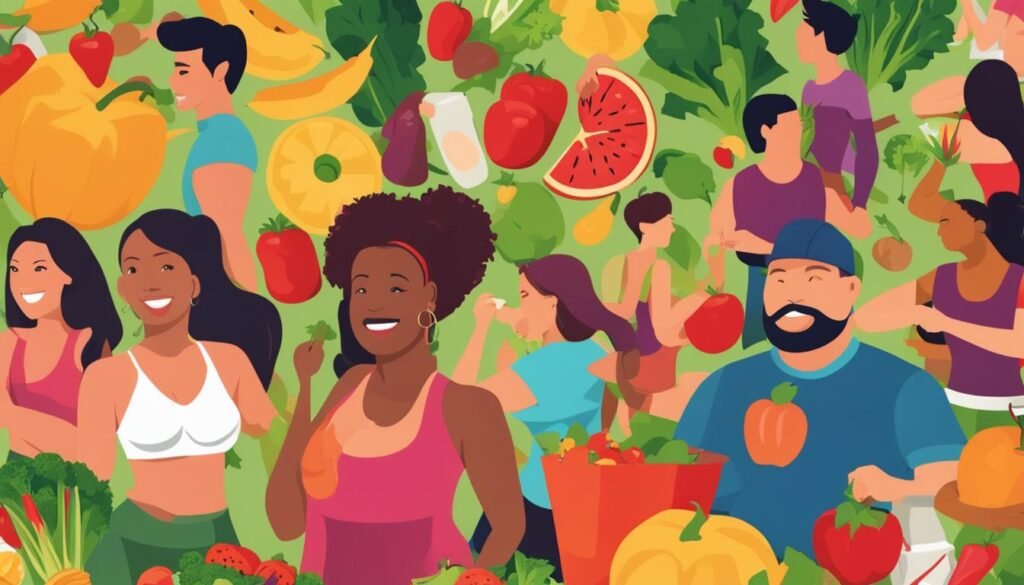
“Before adopting a vegan diet, I struggled with my weight for years. But once I made the switch, everything changed. Not only did I lose the extra pounds, but I also gained energy and improved my overall well-being. The best part is that I found a sustainable way to maintain my weight and live a healthier life.” – Emily H.
“I never thought a vegan diet could help me shed those stubborn pounds, but it did. Not only did I lose weight, but my cholesterol levels dropped, and I feel more vibrant than ever! The key for me was finding delicious plant-based recipes that satisfied my cravings and kept me motivated.” – Michael R.
These success stories reflect the diversity of individuals who have achieved their weight loss goals through a vegan diet. Whether it’s overcoming emotional eating, adopting a whole foods approach, or discovering new plant-based recipes, each journey is unique and inspiring.
- Personalize your weight loss journey: One size does not fit all when it comes to weight loss. Take inspiration from these stories but remember to tailor your approach to what works best for you.
- Experiment with plant-based recipes: Explore the world of vegan cooking and find delicious recipes that make you excited about eating healthier. Get creative and try new ingredients and flavors.
- Focus on the long-term benefits: Weight loss is just one aspect of a vegan diet. Remember that adopting a plant-based lifestyle offers a wide range of health benefits, including improved digestion, increased energy, and reduced risk of chronic diseases.
By learning from real-life success stories and incorporating their strategies into your own journey, you can find the inspiration, motivation, and guidance needed to achieve your weight loss goals on a vegan diet.
Tailoring Your Vegan Meal Plan for Weight Loss
When it comes to weight loss on a vegan diet, tailoring your meal plan is key. By incorporating high-protein plant foods and practicing smart snacking, you can optimize your weight loss journey while still enjoying delicious and nutritious meals.
High-Protein Plant Foods to Include in Your Diet
Protein is an essential nutrient for building and preserving lean muscle mass, supporting satiety, and aiding in weight loss. As a vegan, you can obtain ample protein from a variety of plant-based sources. Consider including the following high-protein plant foods in your diet:
- Legumes, such as chickpeas, lentils, and black beans
- Soy-based products, like tofu and tempeh
- Seitan, a protein-rich wheat gluten
- Nuts and seeds, such as almonds, chia seeds, and hemp seeds
These high-protein plant foods not only provide you with the necessary amino acids but also help promote feelings of fullness, making it easier to stick to your vegan meal plan for weight loss.
Smart Snacking for Sustained Energy
Snacking is an important part of any weight loss plan, as it helps maintain energy levels and prevents overeating during main meals. When it comes to smart snacking on a vegan diet, opt for nutrient-dense options that provide sustained energy throughout the day. Include the following in your snacking repertoire:
- Fresh fruits, such as apples, berries, and oranges
- Vegetable sticks, like cucumber, bell peppers, and carrot sticks
- Raw nuts and seeds for a healthy dose of fats and protein
- Vegan yogurt or cottage cheese alternatives made from plant-based sources
By choosing these smart snack options, you can curb cravings, maintain a stable blood sugar level, and avoid mindless munching on unhealthy snacks.
Conclusion
In conclusion, the vegan diet can be a highly effective tool for weight loss when combined with a balanced and nutrient-dense eating plan. By understanding the basics of a vegan diet, considering the numerous health benefits it offers, and addressing common pitfalls, you can make informed decisions for your weight loss journey.
A vegan diet focuses on plant-based foods, such as fruits, vegetables, whole grains, legumes, nuts, and seeds. These foods are rich in fiber, vitamins, minerals, and antioxidants, which not only support weight loss but also promote overall health and well-being.
However, it is important to remember that the effectiveness of a vegan diet for weight loss may vary based on individual needs and preferences. It is advisable to consult with a healthcare professional or registered dietitian to evaluate the suitability of this diet for your specific requirements and to ensure you meet your nutritional needs.
By making informed decisions and customizing your vegan diet to align with your goals, you can achieve sustainable and long-term weight loss results. Remember to listen to your body, monitor your progress, and make adjustments as necessary. With dedication and consistency, a vegan diet can help you achieve your weight loss goals while enjoying the numerous health benefits it provides.




